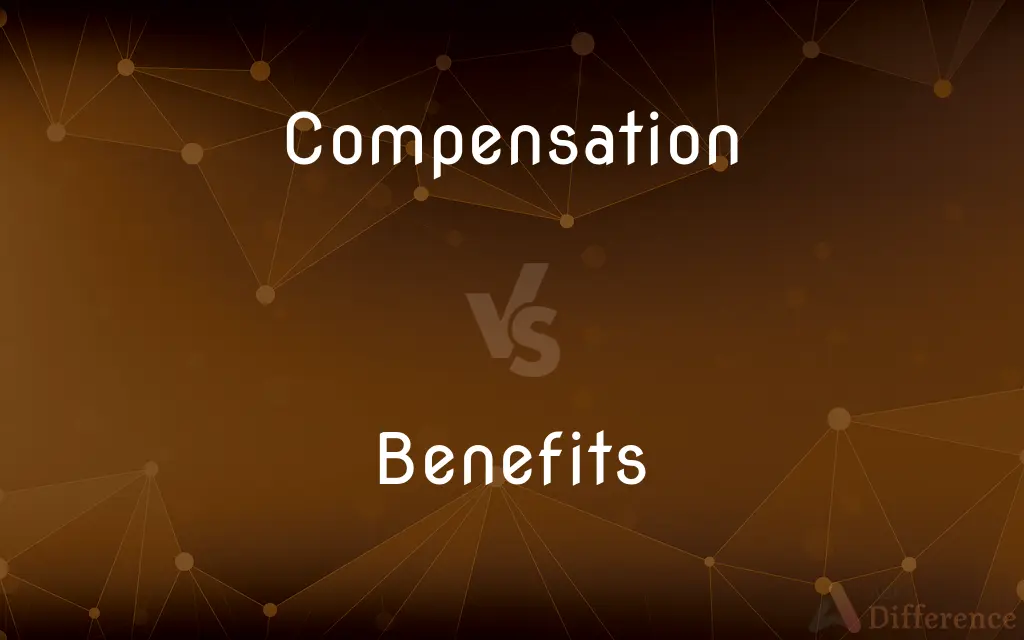Compensation vs. Benefits — What's the Difference?
By Tayyaba Rehman — Published on October 13, 2023
Compensation refers to wages or salary given for work performed, while Benefits are non-wage perks or advantages offered to employees.

Difference Between Compensation and Benefits
Table of Contents
ADVERTISEMENT
Key Differences
Compensation primarily refers to the monetary payment an employee receives for their work. On the other hand, Benefits are additional perks or privileges offered outside of the standard paycheck.
An employee's Compensation is typically outlined in terms of hourly wages, monthly salaries, or annual salaries. However, Benefits might include healthcare coverage, retirement plans, or paid time off.
While Compensation is typically negotiated based on the role, experience, and industry standards, Benefits can vary significantly between companies and might be used to attract or retain talent.
Compensation is a direct reflection of an employee's value, skills, and job responsibilities within a company. In contrast, Benefits might be seen as a way for employers to support the overall well-being and satisfaction of their workforce.
Though both Compensation and Benefits are crucial parts of an employment package, Compensation is often prioritized by job seekers needing immediate financial security, while Benefits might be more valued by those considering long-term growth and well-being.
ADVERTISEMENT
Comparison Chart
Nature
Monetary payment
Non-monetary advantages
Forms
Hourly wages, salaries
Health insurance, retirement plans, paid leave
Purpose
Remuneration for work performed
Attract, retain, or motivate employees
Variability
Based on role, experience, negotiation
Can vary greatly between companies
Long-term Impact
Immediate financial security
Overall well-being, satisfaction, and loyalty
Compare with Definitions
Compensation
Payment in exchange for labor or services provided.
The firm offers attractive Compensation to all its senior consultants.
Benefits
Non-monetary incentives or rewards given to workers.
One of the key Benefits of the job is flexible working hours.
Compensation
A financial reward given for work or services.
The company adjusted his Compensation based on his exceptional performance.
Benefits
Non-wage advantages provided to employees.
One of the Benefits of working there is the comprehensive health insurance.
Compensation
The salary or wages earned by an employee.
Her Compensation increased after her promotion.
Benefits
Supplementary offerings aside from standard pay.
The company prides itself on the Benefits it offers, from dental coverage to paid vacations.
Compensation
Monetary return for effort and time invested.
They discussed his Compensation during the job interview.
Benefits
Additional perks or privileges offered to staff.
The Benefits package includes a gym membership and childcare services.
Compensation
The act of compensating or the state of being compensated.
Benefits
Extra amenities or services provided as part of employment.
Employees often consider Benefits, like retirement plans, when evaluating job offers.
Compensation
Something, such as money, given or received as payment or reparation, as for a service or loss.
Benefits
Something that promotes or enhances well-being; an advantage
The nurse explained the benefits of regular exercise.
Compensation
(Biology) The increase in size or activity of one part of an organism or organ that makes up for the loss or dysfunction of another.
Benefits
Help; aid
The field trip was of great benefit to the students.
Compensation
(Psychology) The act of consciously or unconsciously changing one's behavior to offset a real or imagined deficiency, as in personality or physical ability.
Benefits
A payment made by a government agency or insurance company to qualifying persons in time of need
An increase in welfare benefits.
Compensation
The act or principle of compensating.
Benefits
A form of compensation, such as paid vacation time, subsidized health insurance, or a pension, provided to employees in addition to wages or salary as part of an employment arrangement. Also called fringe benefit.
Compensation
Something which is regarded as an equivalent; something which compensates for loss.
Benefits
A public entertainment, performance, or social event held to raise funds for a person or cause.
Compensation
(finance) The extinction of debts of which two persons are reciprocally debtors by the credits of which they are reciprocally creditors; the payment of a debt by a credit of equal amount.
Benefits
(Archaic) A kindly deed.
Compensation
A recompense or reward for service.
Benefits
To be helpful or useful to.
Compensation
(real estate) An equivalent stipulated for in contracts for the sale of real estate, in which it is customary to provide that errors in description, etc., shall not avoid, but shall be the subject of compensation.
Benefits
To derive benefit
You will benefit from her good example.
Compensation
The relationship between air temperature outside a building and a calculated target temperature for provision of air or water to contained rooms or spaces for the purpose of efficient heating. In building control systems, the compensation curve is defined to a compensator for this purpose.
Benefits
Plural of benefit
Compensation
(neuroscience) The ability of one part of the brain to overfunction in order to take over the function of a damaged part (e.g. following a stroke).
Compensation
The act or principle of compensating.
Compensation
That which constitutes, or is regarded as, an equivalent; that which makes good the lack or variation of something else; that which compensates for loss or privation; amends; remuneration; recompense.
The parliament which dissolved the monastic foundations . . . vouchsafed not a word toward securing the slightest compensation to the dispossessed owners.
No pecuniary compensation can possibly reward them.
Compensation
The extinction of debts of which two persons are reciprocally debtors by the credits of which they are reciprocally creditors; the payment of a debt by a credit of equal amount; a set-off.
Compensation
Something (such as money) given or received as payment or reparation (as for a service or loss or injury)
Compensation
(psychiatry) a defense mechanism that conceals your undesirable shortcomings by exaggerating desirable behaviors
Compensation
The act of compensating for service or loss or injury
Compensation
Monetary remuneration for services rendered.
Her Compensation package was competitive, reflecting her expertise.
Common Curiosities
How does Compensation impact an employee's motivation?
Fair and competitive Compensation can increase an employee's motivation, satisfaction, and loyalty to the company.
How are Benefits different from Compensation?
While Compensation refers to monetary wages, Benefits are non-wage perks or advantages offered to employees.
Can Benefits be considered a part of the total compensation package?
Yes, while distinct from wages, Benefits are often considered part of the total compensation package an employer offers.
Are Benefits mandatory for employers to provide?
Some Benefits, like certain health coverage, might be mandatory in some jurisdictions, while others are discretionary.
How can one evaluate the Compensation offered by an employer?
Evaluating Compensation involves considering the base salary, any potential bonuses, and comparing with industry standards and living costs.
What is Compensation in the context of employment?
Compensation is the monetary payment given to employees for their work, usually as wages or salary.
Are retirement plans considered Benefits?
Yes, retirement plans, like 401(k) in the U.S., are considered Benefits.
Can Compensation include bonuses?
Yes, bonuses, commissions, and other monetary rewards can be part of an employee's Compensation.
Why might companies offer Benefits in addition to Compensation?
Offering Benefits can help companies attract, retain, and motivate skilled employees, promoting loyalty and job satisfaction.
How often is Compensation typically paid?
Compensation, like salaries, is often paid bi-weekly or monthly, though it can vary based on agreements and regional practices.
Are all Benefits the same across companies?
No, Benefits can vary widely between companies, sectors, and regions.
Can Compensation be negotiated?
Yes, Compensation is often subject to negotiation during hiring or promotional evaluations.
Share Your Discovery

Previous Comparison
Speculation vs. Prediction
Next Comparison
Standard Costing vs. Budgetary ControlAuthor Spotlight
Written by
Tayyaba RehmanTayyaba Rehman is a distinguished writer, currently serving as a primary contributor to askdifference.com. As a researcher in semantics and etymology, Tayyaba's passion for the complexity of languages and their distinctions has found a perfect home on the platform. Tayyaba delves into the intricacies of language, distinguishing between commonly confused words and phrases, thereby providing clarity for readers worldwide.
















































